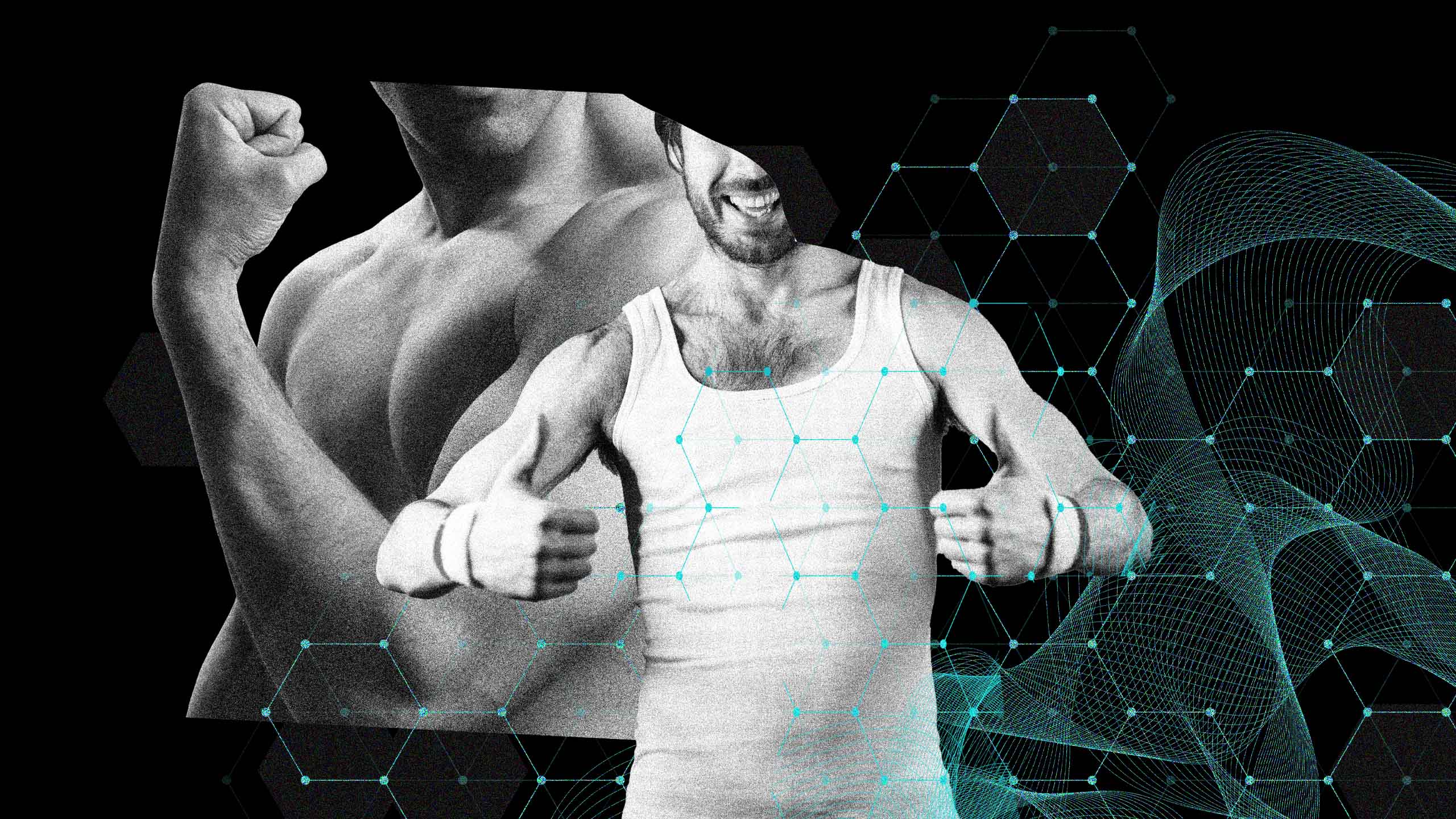Two men share a body. It’s a statement that hints of eroticism, but the singular body also might tip us off to the fact that something here is out of the norm. Still, it’s an accurate synopsis of “Beyond the Sea,” the third episode in the sixth and latest season of the Black Mirror series. This episode, beautifully shot and spanning nearly 80 minutes, offers a rich commentary on one of the series’ favourite motifs: the danger embedded in so much of what we might call—and what this analysis does call—“toxic geek masculinity.” Spoilers ahead!
For over a decade, the Black Mirror series has offered viewers a dark reflection of our relationship to technology. Yet this latest season expands on the formula, focusing on alternate realities. In the case of “Beyond the Sea,” this means a retro return to 1969, the year that the U.S. first sent a man to the moon. Reimagining this event, the episode follows two astronauts—Cliff (Aaron Paul) and David (Josh Hartnett)—aboard a six-year space flight. At the start of the episode, a montage sequence cuts between the two men as they’re back on Earth, interacting with their respective families, but the twist arrives when we learn that the men onscreen are not flesh and blood, but mechanical replicas. The astronauts are already physically onboard their spacecraft, but they spend most of their galactic journey linked to these Earth-bound avatars.
Alone together on the ship, the space cowboys’ setup reminds us of another famous pair: Ennis and Jack (Brokeback Mountain). Cliff’s reservedness around his wife Lana (Kate Mara) is set against David’s warmth and sensuality. David’s eyes linger on Cliff as he repairs the ship’s solar coating. Cliff pauses meaningfully after leaving David before returning to his wife. The quiet and restrained manner of the two, waking together each week to go about their “real” lives, makes the entire ship a metaphorical closet.
The setup, however, is quickly disrupted by another narrative turn when an antagonistic group on Earth that views the android bodies as “abominations” violently murders David’s family, destroying his avatar in the process. Without his replica, David is forced into isolated grief aboard the spacecraft. Discussing the event with Lana, Cliff offers David a brief reprieve by letting the widower into his own avatar.
Up until this moment, Cliff has kept a tenuous distance from his wife and child. As his body is occupied by David, a new love triangle emerges. David finds a new lease on life, and his friendship with both Cliff (in space) and Lana (on Earth) grows. At first, Lana seems happy to have a new friend, but David’s romantic overtures result in a growing unease. Cliff and David’s friendship also seems to grow until jealousy erupts on both sides. Cliff tries to cut things off between David and Lana while David insists that Cliff doesn’t deserve the life he has. Through a warped logic, the widower co-opts Cliff’s avatar, kills his family back on Earth, and smugly reunites with Cliff onboard.
At its core, it’s a familiar narrative structure—fridging a leading man’s wife to drive the plot—here, doubled to construct violent bookends that begin and end with broken masculinities. Brooker suggests the episode is analogous to work-from-home conditions during the pandemic. Maybe it started that way, but it seems to me that the narrative goes far afield from that setup. Instead, I’d argue that the black mirror offers a better reflection of toxic masculinity, as it’s glitched on to our digital environments.
“Geeks are most often cisgender white men who relegate all others to the outskirts.”
Digital scholars Anastasia Salter and Bridget Blodgett have referred to this new landscape as “toxic geek masculinity.” It builds on the more commonly discussed phenomenon of toxic masculinity, embedded in many past Black Mirror episodes: the violence of “The Entire History of You,” the emotional illiteracy of “Striking Vipers” and the domineering entitlement of “USS Callister.” But this last episode also previews what Salter and Blodgett mean when discussing “toxic geek masculinity.” Think Revenge of the Nerds; it’s a mentality that rejects hypermasculinity and its familiar jock stereotypes, monopolizing on a cultural investment in the underdog narrative, but resulting in only newer modes of the same old problems: entitlement, a resistance of femininity, an investment in boundary maintenance. Not just anyone can be a geek. A geek has a very specific knowledge base, and a geek defends the geekdom from those who aren’t “true” geeks. The result is that geeks are most often cisgender white men who relegate all others to the outskirts.
While the examples of masculinity presented in “Beyond the Sea” may at first seem like the original model of toxic masculinity, they take on the dynamics that Salter and Blodgett describe as the narrative progresses. Neither the artistic David nor the stoic Cliff appear violent to begin with, but hints of something darker lurk within these men. This comes to a head when David ultimately takes over Cliff’s avatar body in order to kill Lana and her son. His calm demeanour doesn’t fit his actions. It’s as if he’s stepped into a video game, made his kills and returned home with no real-world concerns. It reveals one effect of toxic geek masculinity culture: an overreliance on the “magic circle.”
In games and digital media, the “magic circle” is the space in which the normal rules of the world are suspended and replaced by the artificial reality of a game world. Think of tennis. When playing tennis, all players operate under a shared understanding of the game. If I hit the ball into a serving area of the court and my opponent fails to return it, people might cheer. My action has some sort of reward attached to it, but outside the game—outside of the magic circle—the ball’s placement doesn’t really matter.
The game scholar Mia Consalvo, however, argues that there is no such thing as the magic circle. In many games, the “magic circle” might allow a certain action to fly, but outside the game, real-world consequences may still result. Revisiting my tennis match, if I begin to play in an excessively aggressive manner, returning every hit so that it’s aimed directly at my opponent’s head, this behaviour is likely to affect them whether we’re inside or outside the world of the game. Even when the match is over, my opponent is likely to hold a grudge.
This happens frequently within video games, highlighted, for instance, in the events surrounding Gamergate, the mid-2010s’ campaign in which toxic geek masculinity in the gaming community reared its head—harassing, threatening, even doxing a group of women who’d attempted to point out misogynistic elements within much of the industry. The men behind these efforts frequently excused their actions by gesturing to the magic circle. In what was intended as a public “apology,” one Gamergate culprit ultimately doubled down on his earlier behaviour, saying, “Mild hostility has always been a defining characteristic of the fighting game scene.” In “Beyond the Sea,” David’s wry smile—evading the reach of repercussions at millions of kilometres from Earth—suggests a similar idea. Within the avatar-filled magic circle of toxic geek masculinity, bad behaviour remains outside the scope of moderation, civility, legality. But many, understandably, are unable to see it this way.
While some critics have proposed that the Black Mirror series has gone too far afield in their latest offerings that split from earlier digitized musings, I’d suggest that we only need to take a closer look. The contemporary reflections that lurk in this season’s turn to the past offer a perfectly lucid view of the toxic geek masculinity that’s increasingly coded into so much of our internet culture today.


 Why you can trust Xtra
Why you can trust Xtra


